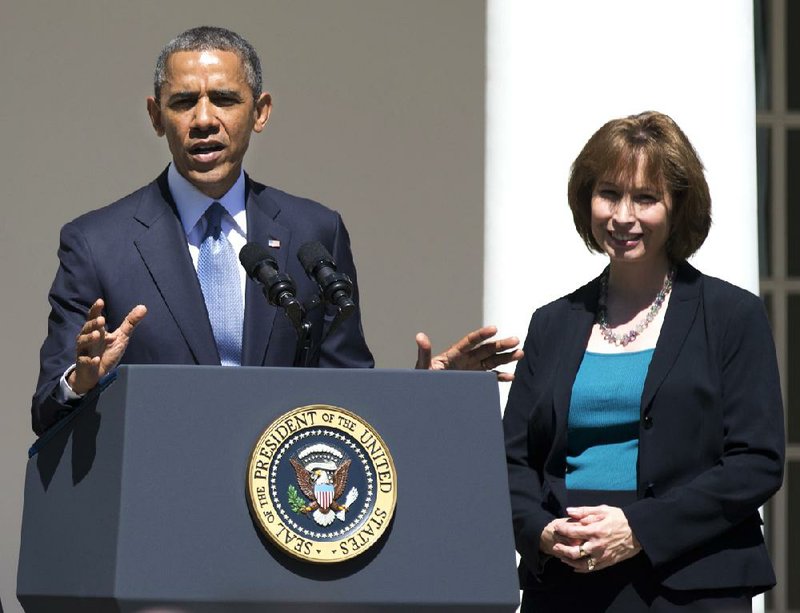WASHINGTON - Majority Democrats in the Senate won approval Tuesday for one of President Barack Obama’s key judicial nominees, the first of his picks to win confirmation since they weakened the chamber’s filibuster rules.
RELATED ARTICLE
http://www.arkansas…">Congress hits deal to restore spending
Amid a series of actions Tuesday, senators voted 56-38 to approve Washington lawyer Patricia Millett to join the U.S. Court of Appeals for the District of Columbia, the nation’s second most powerful court.
Democratic Sen. Mark Pryor of Arkansas voted yes on Millett’s confirmation, while Republican John Boozman voted no. Sens. Susan Collins of Maine and Lisa Murkowski of Alaska were the only Republicans to join Democrats in supporting Millett.
Both sides saw Millett’s appointment as pivotal. It will give Democratic-appointed judges a 5-4 majority over those chosen by Republican presidents for that court, which rules on the legality of White House actions and regulations from such agencies as the Environmental Protection Agency and the Federal Communications Commission.
Senate Judiciary Committee Chairman Patrick Leahy of Vermont praised Millett as “an extraordinary nominee with impeccable credentials for this important appellate court.”
While Republicans have said they oppose adding judges to the court and tilting its balance when its caseload is smaller than other federal appeals courts, Leahy said the complexity of the cases before the court justify filling its vacancies. Before Millet’s confirmation, there were three vacancies on the court. Sen. Charles Grassley of Iowa, the committee’s top Republican, said that when Obama fills those three seats, “you’ll have a rubber stamp for his anti-business regulations.”
Obama praised Millett’s confirmation in a statement released by the White House, saying her nearly three dozen arguments before the Supreme Court are the second most ever by a female attorney.
“She has served in the Department of Justice for both Democratic and Republican presidents. I’m confident she will serve with distinction on the federal bench,” Obama said.
After Millett’s confirmation, the Senate also confirmed Rep. Mel Watt, D-N.C .,to head the Federal Housing Finance Agency.
Democrats again took advantage of the weakened filibuster rules, voting 57-41 in favor of Obama’s pick to head the agency that oversees the Federal National Mortgage Association and the Federal Home Loan Mortgage Corp., the home-mortgage lenders known as Fannie Mae and Freddie Mac, respectively, which own or guarantee about half of all U.S. mortgages.
Pryor voted in favor of Watt’s confirmation, while Boozman voted against it.
Republicans have said Watt is unqualified to lead the agency. Democrats have said the 21-year House veteran has the necessary skills and is opposed by Republicans because they think he is too liberal.
Later, senators voted 56-42 to end a filibuster against the nomination of lawyer Cornelia “Nina” Pillard for another vacancy on the D.C. circuit. Her confirmation was expected later this week.
Millett, 50, the first nominee to emerge from the highly partisan filibuster fight, is a veteran lawyer who has argued 32 cases at the Supreme Court and has strong bipartisan credentials.
A Harvard Law School graduate, Millett served as an assistant to the solicitor general under President Bill Clinton, a Democrat, and President George W. Bush, a Republican. She then joined the Supreme Court practice at Akin Gump, one of Washington’s biggest law firms.
Last month, the Senate’s Democratic majority used Millett’s stalled nomination, among others, as the basis to change long-standing Senate rules by lowering the voting threshold needed to advance presidential nominations - a step called the “nuclear option.”
Until then, the Senate’s minority party could block any presidential nomination from advancing unless there were60 votes to cut off a filibuster. Democrats said unprecedented obstruction of Obama nominees forced them to make the rule change to allow simple majority votes on most presidential appointments - excluding Supreme Court nominees.
Republicans opposed the step, warning Democrats that they will regret it whenever they lose control of the chamber.
Republicans continued to assail Democrats for the maneuver Tuesday. Republican leader Mitch McConnell said that “for the president and his enablers the ends now clearly justify the means.”
In retaliation for the filibuster changes, Republicans used the Senate’s own procedures to slow its work and said they would continue doing so.
They forced three procedural votes before Watt’s nomination could be pushed ahead. They also blocked permission - usually granted routinely - for a pair of committees to meet for more than two hours while the Senate was in session.
Meanwhile, Democrats and their allies hailed Tuesday’s votes as a triumph, with more to come.
“The minority caucus has dedicated the last five years to paralyzing the Senate,” said Sen. Jeff Merkley, D-Ore., among a cadre of newer Democratic senators who helped push party leaders to change filibusters. “Today I saw as a good sign.”
Senate Democrats are set to spend much of the next two weeks, the chamber’s last scheduled work period before breaking for the Christmas holiday, clearing a backlog of nominations, including two other Obama nominees to the D.C. Circuit Court, as well as his picks to head the Federal Reserve and the Department of Homeland Security.
Republicans retain options under Senate rules to slow but not stop presidential appointments by themselves. For appeals court and Cabinet-level appointments, they can still make majority Democrats put off a final confirmation vote for up to 30 hours. For lesser posts like Watt’s, the maximum is eight hours.
Republicans can also force at least one procedural vote on each nominee before roll calls are taken to end filibusters and for final approval. Each requires only a simple majority for Democrats to prevail.
Sen. John McCain, R-Ariz., promised to support tactics to delay nominees, saying he hadn’t gotten a chance to properly scrutinize nominees, including Jeh Johnson, Obama’s pick to lead the Homeland Security Department.
“It’d be fine with me,” McCain said, when asked if that meant long nights or sessions bumping up against the Christmas break.
McCain made the comments after Senate Majority Leader Harry Reid on Monday asked for unanimous approval of 76 nominations - including Johnson and Janet Yellen to lead the Federal Reserve. Sen. Lamar Alexander, R-Tenn., rose to object, slowing but not stopping the nominations.
Alexander, a former secretary of Education under President George H.W. Bush, called the filibuster rule change “the most stunning development in the history of the United States Senate.”
“The goal was to help the administration and the Democratic majority advance its radical agenda unchecked through the courts and the executive agencies,” Alexander said in an extended floor speech Monday evening. “If there is no integrity to the rules of the Senate, there is no integrity to the Senate.”
Most of the nominees slowed by Alexander’s objection were for minor posts, including some federal judges, lower-level ambassadors and government boards.
Information for this article was contributed by Henry C. Jackson, Alan Fram and staff members of The Associated Press; by Michael A. Memoli of the Tribune Washington Bureau and by James Rowley of Bloomberg News.
Front Section, Pages 5 on 12/11/2013

